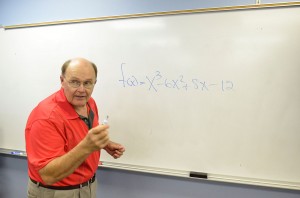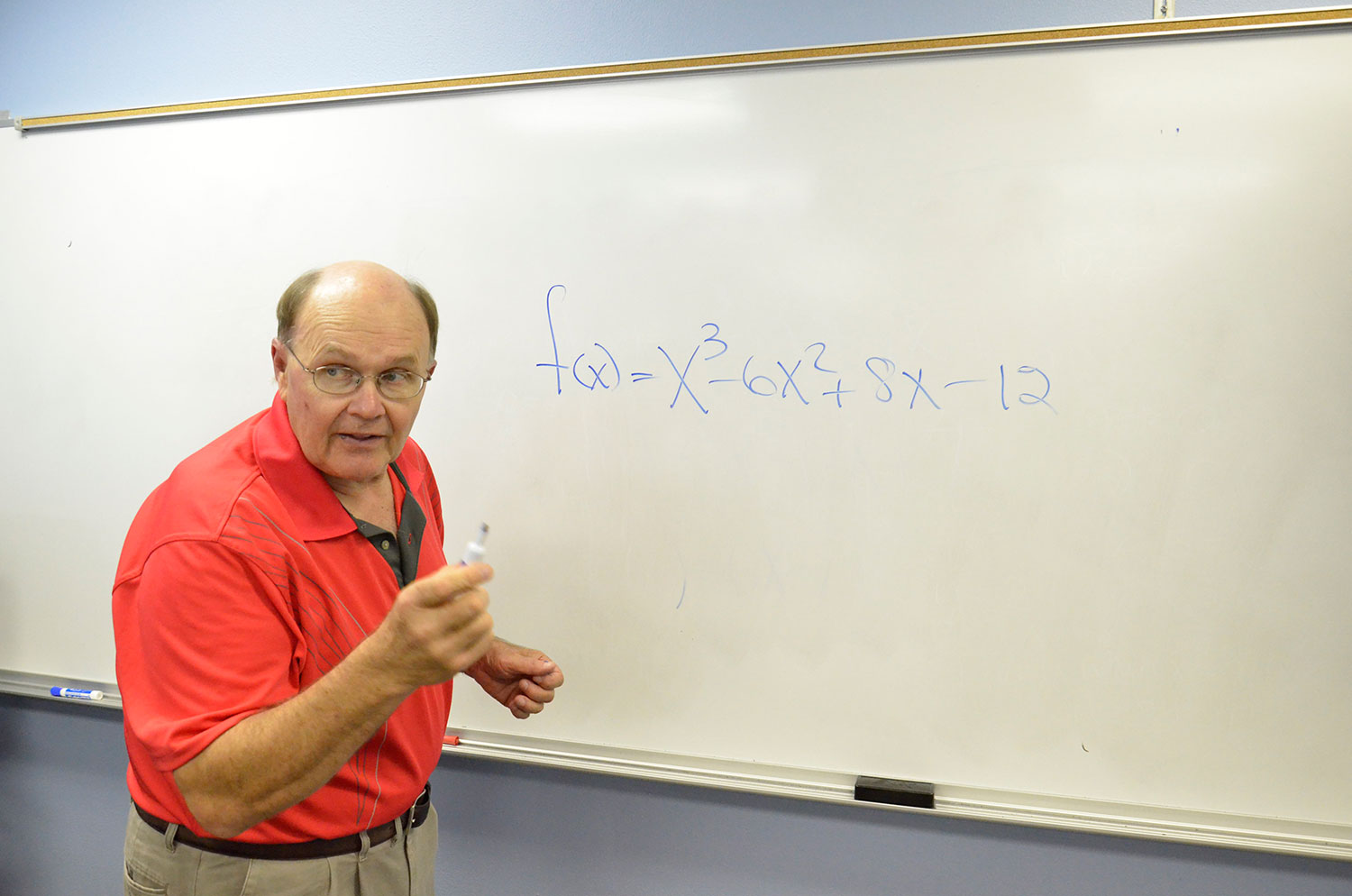By Joshua Knopp/special assignments editor
Part three in a five-part series on winners of the Chancellor’s Award for Exemplary Teaching, an annual recognition of professors who impress and inspire their students.

.David Reid/The Collegian
Eight feet of snow covered the ground in Minnesota during the spring break of David Gustafson’s senior year of college.
Attending Augustana College in South Dakota, Gustafson spent the break at home in the cold. That was when he decided to come to Texas.
“If you don’t go south, you’re nuts,’” he recalls his father telling him. “I left Minnesota with everything I owned in the back of a Plymouth Road Runner.”
The University of Texas at Arlington had offered him a full ride through graduate school if he taught some freshman-level math classes. He went through graduate school, taking three classes at a time while teaching two.
With one semester left, he got a job at Trinity Valley School in Fort Worth, where he would teach all levels over the course of 17 years. Along the way, he landed a part-time job at TCC and eventually started full time in 1989.
Now, the South Campus math assistant professor is a Chancellor’s Award winner.
Gustafson said while he enjoyed teaching at Trinity Valley, in the end, he felt he wasn’t as needed by students already eyeing Massachusetts Institute of Technology and Yale.
“There, I had really high-achieving students,” he said. “And then I come to TCC where the students here are the ones who didn’t go to four-year schools. I think I serve students better here.”
Calculus student Rasheed Johnson said Gustafson accomplishes what he tries to do — make math fun.
“In the first place, he makes the class interesting, and that’s something you need with math,” Johnson said. “He makes it look easier. The fun part is what I wasn’t expecting.”
Classmate Paul Awadalla echoed the sentiment.
“He’s pretty good at making the class entertaining,” Awadalla said. “Other teachers would just read off the books, but he actually understands. He puts a little humor into the class.”
Growing up a sharecropper in southwestern Minnesota, Gustafson said it wasn’t easy to carve his way to college.
Gustafson said he misses Minnesota’s changing seasons. Autumns and springs were cool and crisp. Winters had deep consistent snow, and summers were the best time to be there, he said.
“Here, we kind of have two seasons,” he said. “Summer and blah.”
Gustafson said he’s learned to adjust and noted that Minnesota’s -40-degree winters were as extreme as Texas’ 110-degree summers. That said, he normally makes his visits home in the summertime.
“We always get out of here for at least a week to get out of the heat,” he said. “You have people that go to hotter places for vacation. It just hurts my head.”
In high school, Gustafson played football.
Though he was a starting offensive guard in his junior and senior years, he knew that he wouldn’t make it professionally.
“High school football was OK because I was one of the bigger guys,” he said. “College, I was one of the smaller guys. At the time, I was 5-10, 215.”
Fortunately for him, math had always been a strong subject.
“It did make sense,” he said. “All the puzzle pieces fit nicely.”
When he got to college, Gustafson stuck with math and relished the new forms he was taught.
“[In college,] we start lifting off the ground in terms of what we’re familiar with and into realms of ‘Who would dream up this stuff?’” he said.
Bachelor’s degree in hand, he was offered his UTA scholarship and, with his father’s shrewd encouragement, headed to Texas.
Gustafson’s teaching effectiveness extends beyond his classroom. Student William Harrod, in his second semester as a tutor in the South Campus math lab, said Gustafson’s method of teaching higher math helps him turn around and assist peers in understanding algebra.
“He’s pretty good at explaining it all,” Harrod said. “The way he explains problems helps me learn to explain it to someone who’s on a lower level than I am.”
In the end, Gustafson just wants to help students.
“I want students to know that they’re here for a reason, and I can help them if they want me to,” he said. “I’m here to help students at TCC in the field of mathematics.”

